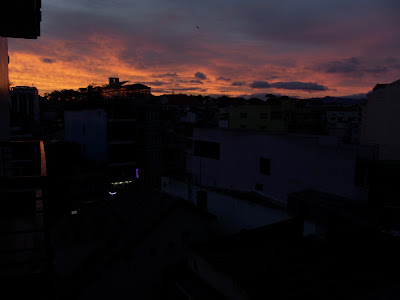The train from Kolkata.
I left Darjeeling by dawn's twilight, a dry, cold wind worming through my coat. Crawling out my room's second story window I balanced, teetering, carefully on the narrow ledge affording myself one last solitary moment to take it all in. Down the weathered street chai stalls were coming back to life, exhaling long held breaths of steam. Further on, the hunchbacked silhouettes of laborers slowly emerged from a dense morning fog rising out of the valley. Loads of bricks on their backs, slung up by a paltry piece of fabric across the forehead, they lurched jerkily ahead like the seconds hand of an antique clock.
Weeks later I would be on a town local puttering through mud-hut
villages, the relentless sun searing parched countryside and
transforming my rickety aluminum bus into a furnace. I saw my immediate future as well: I would walk in the
cold, limping through old and empty lanes, trying to catch any
crease of dappled sunlight to warm my back. Back to the town
center I'd arrived at nearly a week earlier I'd see virtually the
same sight, everything already on full tilt and clamoring. Cars, busus,
tuk tuks, smoke billowing from them and seemingly everywhere else,
mingling with the mist, the great cloud fueling itself. But,
at that precise moment dripping with clarity, I knew that I was out on an old
ledge that had surely seen greater fools, recollecting the beginning of a odd journey.
Now, after many years, Darjeeling can be a difficult town to remember. Like anything that seems
so right in its place you struggle with its existence, like recalling a
myth or dream. The memory of its dirty, dank alleys will funnel you
back to a journey along its streets you couldn't possibly have taken.
Everyday experiences that had even become normal to the point of
banality at the time now hold a tinge of regret, as though having been there
was a sort of carnal pleasure you may have been better off not partaking in. Over time, in this case three years, distinct moments fade to snapshots; mere glimpses of untold stories that may just as well stay that way.
Darjeeling
We arrived as a group, the five of us, all equally unburdened travelers who had met in Kolkata and were all heading in the same direction. We laughed uproariously and often in our northbound train, at everything, all of us having caught that same contagious traveler delirium of being in a strange place with strange folks who weren't even so strange; at the rats scurrying over our feet, at the bombardment of nuts and snacks from vendors. Our cabin's other passengers not sure what to make of it all. We weren't entirely sure either. It was indeed a fine start.
Then our bloodshot eyes were given their first glimpse of Darjeeling, the cobbled mystery, bathed in culture, history, trash, and grime. Ringed by beauty and wild, yet rising above like the old, rusted bow of a ship sunken in shallows. We climbed the crooked alleyways that cross all the snaking roads in a straight shoot to the top. To a dilapidated hotel with a homely sitting room and a view into a peculiar and beautiful valley. Our shared room was a cold, reclusive place, stacked with hard-mattressed beds and scant furniture. It had an untouched, noble air about it and I really only went there to sleep, wearing every sweater I had.
Days the group would split and fracture, walking for miles to do nothing and sit on benches and the steps of old churches, talking about nothing. Javier the Chilean and I would visit the rolling hills of tea, always returning to the town square to recoup, drink 10 rupee chai, and watch the afternoon loll by and watch old ladies feed birds and young children ride ponies and watch the sun and its light slowly drift away bringing back that dank, sullen cold. For a time it seemed we entirely subsisted on chai, momos, and chicken and onion filled rotis. There were candlelit chess games when the whole town lost power and we welcomed the lukewarm beers our hosts provided. Days like this would wallow open and shut at seemingly interminable intervals then ending in sonorous swirls, the last mutterings of an old town falling back asleep.
Staring back into all of this, I finally leapt and took my plunge. Landing poorly, I was instantly mauled by chilly ,dew-slicked cobble, morning mist , and a stray dog that scared easily. The fog was cracked slightly with an awakening sun and, even with only a vague idea of where I was going, I knew that the day would unravel fine.
The view from a pass in Darjeeling, a Gorkha flag waving in the wind.
This slogan was everywhere. The Gorkhas, a little-known ethnic group who are pushing for separatism.
The ubiquitous stairways that push through the heart of the city.
Students warming in the sun.
The view from inside a Darjeeling tea factory.
A temple skirting the town's North side.
Prayer flags in flight.


































